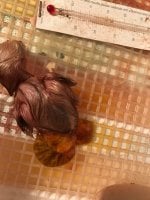I have a friend who is hatching some eggs from my hens. She just texted me this picture, two of the chicks hatched like this.

Is this an unabsorbed yolk sac? Is there anything we can do to help these chicks survive? I have heard of "chick in a cup," is that the appropriate thing to do? Any tricks to getting the chicks to survive? This yolk sac is WAY bigger than I expected an unabsorbed yolk sac to look like!
Second part of the question, what is the likely cause? Humidity? Temperature? How can we fix our incubating procedures so this doesn't happen again? Or was it genetics?

Is this an unabsorbed yolk sac? Is there anything we can do to help these chicks survive? I have heard of "chick in a cup," is that the appropriate thing to do? Any tricks to getting the chicks to survive? This yolk sac is WAY bigger than I expected an unabsorbed yolk sac to look like!
Second part of the question, what is the likely cause? Humidity? Temperature? How can we fix our incubating procedures so this doesn't happen again? Or was it genetics?
Last edited:


